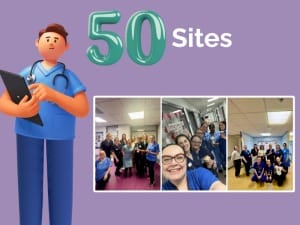In recent years, the importance of antenatal and early pregnancy care has become increasingly evident as more women are discovering their pregnancies earlier. This early detection underscores the critical need for comprehensive care during the initial stages of pregnancy.
The Importance of EPAGUs
Data reveals that inadequate antenatal care can lead to premature births and complications, highlighting the urgency for improved healthcare services.
Early Pregnancy and Gynaecology units (EPAGUs) within hospitals play a pivotal role in managing emergency or complicated pregnancies during the first trimester. Typically midwife or nurse-led, with consultant and doctor input, these units provide essential support for women facing distressing situations, often indicating potential emergencies. For women experiencing repeated complications, EPAGUs offer vital, comprehensive care, ensuring they receive the necessary support during the early stages of pregnancy.
Early Pregnancy Care within the NHS
Early pregnancy care and prenatal care are key priorities highlighted in the Better Births National Maternity Review Report and the Maternity Transformation Plan. Early pregnancy care is specialised and distinct from other units, as it focuses on triaging and treating patients on an outpatient basis.
EPAGUs are becoming much more utilised in the UK for several reasons. Women are attending early pregnancy units due to the rise of complicated pregnancies. This trend can be attributed to various factors, including the fact that more women are becoming pregnant later in life and needing closer monitoring throughout their pregnancies. Additionally, advancements in medical technology and increased awareness about the importance of early pregnancy care have contributed to this rise. By offering specialised care and prompt interventions, healthcare providers can address potential issues before they become more serious, leading to better outcomes for both mothers and infants.
Monitoring pregnant women with long-term health conditions in early pregnancy is essential for several reasons. It helps manage risks associated with chronic conditions like diabetes and hypertension, ensures safe medication adjustments, and prevents complications such as pre-eclampsia and gestational diabetes. Additionally, it provides specialised nutritional and mental health support and allows for personalised care plans to be developed and adjusted as needed.
How do EPAGUs and Maternity Units link together?
Many women initially receiving care in the early pregnancy unit transition to maternity units as their pregnancies progress. Midwives and consultants often work across both maternity and early pregnancy services due to their specialised skills. Consequently, early pregnancy care is an essential part of maternity care and should not be overlooked.
Connecting EPAGUs and Maternity Units is crucial for seamless care from early pregnancy to childbirth. Shared resources and staff optimise efficiency, while comprehensive care in one location reduces multiple appointments. Enhanced communication ensures coordinated care, and quicker emergency responses are possible.
By ensuring that women receive comprehensive support and guidance from the outset, healthcare providers can better manage potential complications and promote healthier outcomes for both mothers and babies. This holistic approach not only enhances the quality of care but also fosters a supportive environment for families during a critical period of their lives.
Investing in EPAGUs
EPAGUs are an integral part of a woman’s care, providing support during some of the most stressful and distressing times in their lives. Investing in these units is crucial for improving maternity care, particularly with a woman-centred approach.
Identifying potential complications early, such as diabetes or multiple premature births, is essential for protecting both mother and child throughout pregnancy. However, the majority of EPAGUs still rely on paper records and, due to their specialised nature, cannot utilise standard hospital-wide Electronic Patient Records (EPR).
Digitising EPAGUs offers several important benefits. Digital systems can help to streamline administrative tasks by improving efficiency and allowing healthcare professionals to focus more on patient care. Real-time access to patient records enables quicker decision-making and more effective coordination of care. Enhanced patient tracking ensures prompt follow-ups, reducing the risk of missed care. Overall, digitising EPAGUs significantly enhances operational efficiency within the unit and facilitates better integration with maternity services.
As more women are experiencing complicated pregnancies, EPAGUs are becoming increasingly busy. Therefore, introducing systems and procedures to improve staff capacity is essential for maintaining high-quality care.
Next steps
You can learn more about our BadgerNet Early Pregnancy and Gynaecology Unit (EPAGU) module and its benefits in our fact sheet and benefits calculator.
Find out how BadgerNet joins up perinatal care by watching our on-demand webinar.
If you have any questions or require further information, please don’t hesitate to contact your account manager or fill in the contact form today.






